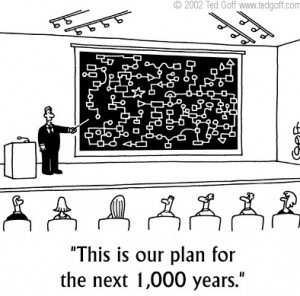A core assumption in much of strategic management research is that more accurate forecasts of future competitive actions or the future value of certain business capabilities will lead to strategic success. Executives have long been exhorted to conduct analyses of internal and external environments and construct scenarios of the future. However, seeing strategy in this way has some serious weaknesses. It assumes that accuracy can be achieved through rigorous analysis and conscientious efforts to overcome individual biases in perception. It also assumes that the process will be relatively frictionless and primarily analytical.
There is an important tension at work here. Because the future is essentially unknowable, leaders must rely on the past for information and insight. Moreover, given that the future is unknown, there are likely to be differences and conflicts within the organization about what that future might hold. Such conflicts can impede progress on the development and execution of new strategies — especially innovative strategies that depart significantly from a company’s current approach to the market.
Studies have pointed to the “abject failure” of most forecasting efforts to attain the desired precision. While strategy researchers tell managers they should project into the future, we tell them little about how to do this.

